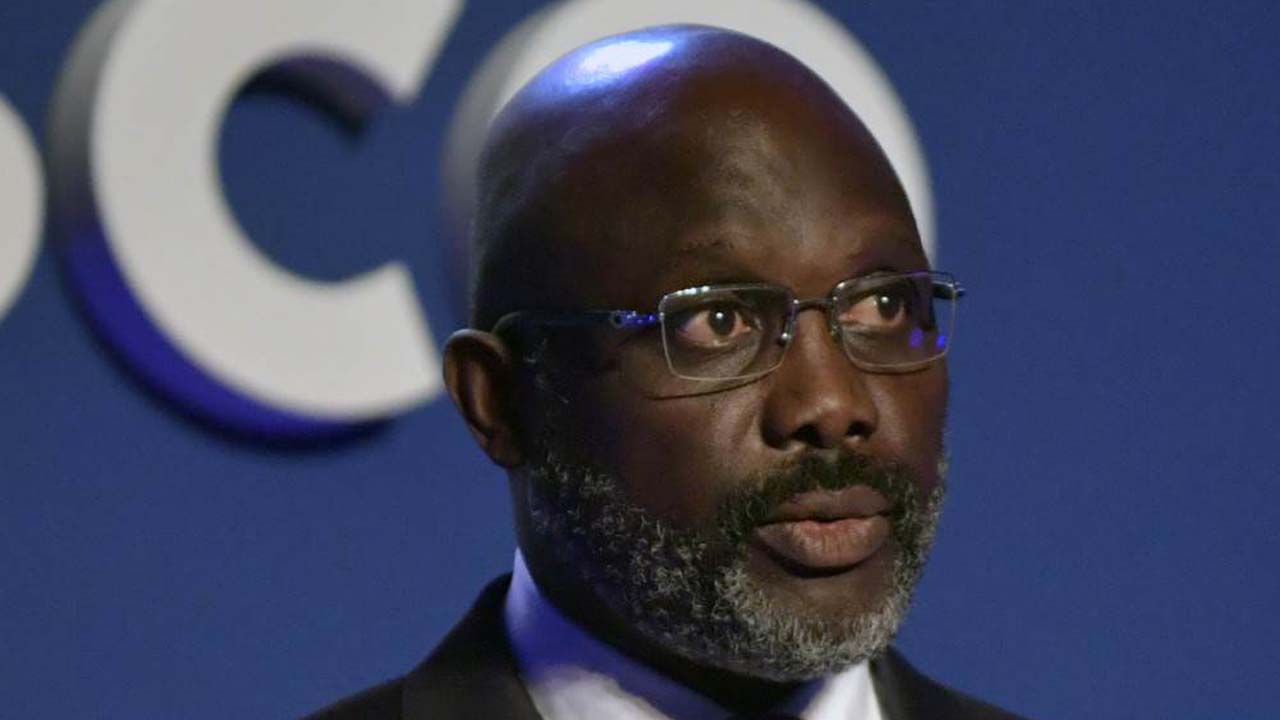George Oppong Weah. PHOTO | AFP
Outgoing Liberian President George Oppong Weah has, at the age of 57, already excelled on two major fronts and there is still plenty of time ahead for him to further showcase his excellence. On Friday evening, November 17, the former global soccer icon did something that hardly happens in Africa, especially in West Africa.
On analysing the presidential run-off election results that were already in, Weah, who was trailing opposition leader Joseph Boakai, realised that he was losing the match and decided to throw in the towel. Then, Boakai led with 50.9 per cent of the vote over Weah’s 49.1 per cent, with nearly all the votes counted.
The politician, who first made his name on the soccer fields of Europe’s top leagues, is not a sore loser, after all. And this explains why tranquillity has prevailed after his defeat in the hard-fought election.
Weah went on national radio in the capital Monrovia to concede defeat after telephoning his 78-year-old opponent to congratulate him on his victory. He also urged his supporters to accept the result and welcome the impending change of leadership.
In his address to the nation, Weah said: “The results announced tonight, though not final, indicate that Ambassador Joseph N. Boakai is in a lead that we cannot surpass. Therefore, a few minutes ago, I spoke with President-elect Joseph N. Boakai to congratulate him on his victory.
“Tonight, as we acknowledge the results, let us also recognise that the true winners of these elections are the people of Liberia.”
He said his party had lost the poll but “Liberia has actually won, and this is the time for graciousness in defeat, to put national interest above personal interest”.
The President has since won accolades for a gesture that breaks the trend in West Africa that has seen military coups become the norm once again.
The United States Government congratulated President-elect Boakai on his victory and President Weah for his peaceful acceptance of the results.
“We call on all citizens to follow President Weah’s example and accept the results,” US State Department spokesman Matthew Miller said in a statement.
International observers, including the European Union, have praised Liberia for holding a peaceful election. The EU acknowledged the development as a sign of remarkable improvement in the democracy of Liberia — one of the African countries that was several decades ago torn apart by civil war.
The Economic Community of West African States (Ecowas) said the election was “largely” peaceful, but it noted isolated incidents that led to “injuries and hospitalisations” in four provinces.
In September in Gabon, the military overthrew President Ali Bongo, ending his family’s long dynastic rule. Also ousted in coups were the Presidents of Mali, Niger, and Burkina Faso, eroding the democratic gains on the continent from the 1980s wind of change.
Weah, the former mercurial professional footballer dribbled his way through without any hesitation after the National Elections Commission (NEC) released provisional results. Boakai, a former Vice-President, won 51 per cent of the votes.
President Weah, who was voted into office in 2017, will officially step down in January, ending his Congress for Democratic Change party’s rule.
The run-off was triggered after he secured a victory in October with 7,000 votes over Boakai, falling short of the required 50 per cent threshold to clinch an outright victory. He was seeking re-election to a second six-year term, after his first was marred by corruption scandals and mismanagement.
But he has been praised for immediately conceding defeat, paving the way for a peaceful transfer of power in a country that has in the past been marred by civil war that resulted in leaders being killed in office.
Weah, who was born on October 1, 1966, in Monrovia, served as the Senator for Montserrado County before he ran for President. He is married to Clar Weah and they have three children: Timothy Weah, George Weah Jr and Tita Weah.
His son Timothy has taken after his father, and plies his trade in Italy, where he turns out for Juventus FC in the Serie A, and is also a member of the United States national team, as he holds dual Liberian and American citizenship. His elder brother, George Weah Jr, is a retired professional footballer.
George Weah was named the African, European, and World Player of the Year in 1995, which was a great achievement. As he excelled on the soccer pitch, he was also engaged in activism to help bring an end to a long civil war in his country. He later became active in politics.
He honed his football skills on the dusty streets of Monrovia and played in the national league before joining top Cameroonian club Tonnerre of Yaounde, which won its league in his first season (1987). The then-promising 22-year-old striker was signed by AS Monaco of the French First Division.
In his five seasons with Monaco (1987–92), he scored 57 goals, and the team won the French Cup in 1991. He would later sign a lucrative contract with Paris Saint-Germain (PSG). In his most acclaimed season, he led PSG to the French Cup, to the league title, and to the semifinals of the 1995 European Champions League.
He also turned out for AC Milan in Italy’s Serie A, helping the club to win the 1996 and 1999 league titles. He later joined Chelsea, and played briefly for Manchester City and Marseille in France. He played for, coached and financed the national team, Lone Star.
He clinched the African Footballer of the Year award three times and was the first African to win the Ballon d’Or in 1995, and be named Fifa World Player of the Year.
Jaywanyama22@gmail.com




